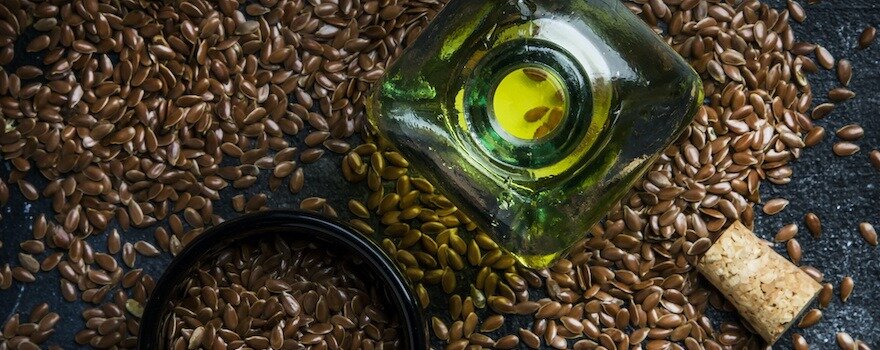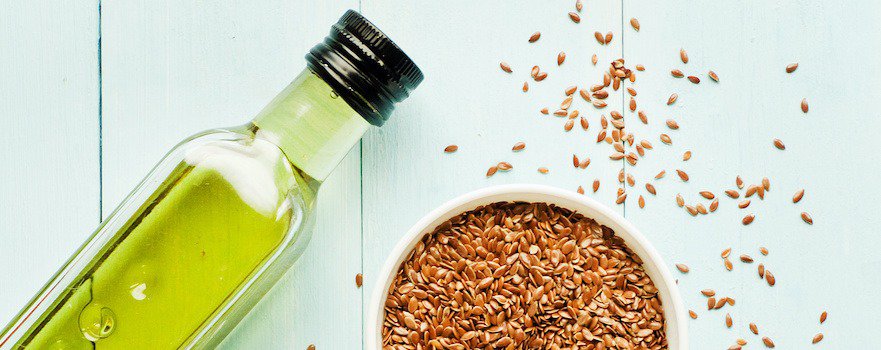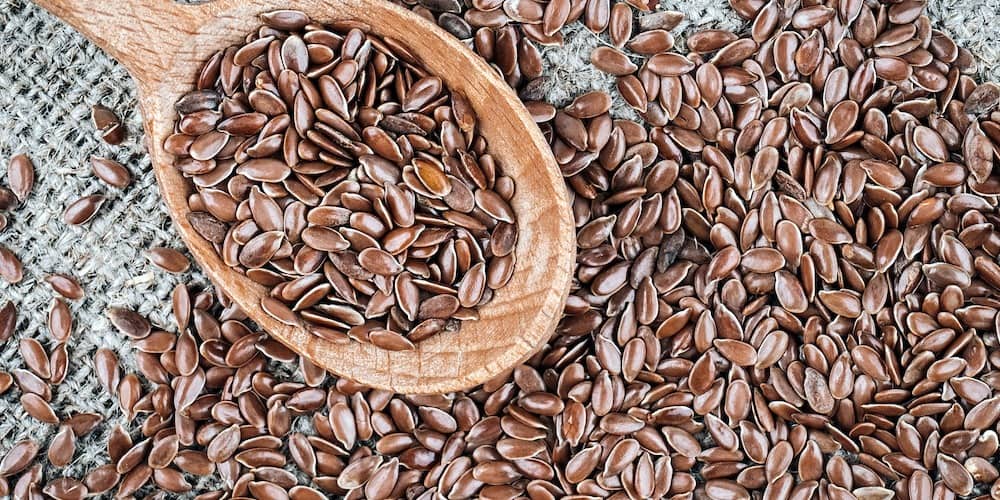BENEFITS OF FLAXSEEDS
✓ Support cardiovascular health
✓ Improve digestion
✓ Aid in weight loss
✓ Reduce cholesterol levels
✓ Improve diabetes
What are flaxseeds?
Flaxseeds are harvested from the plant Linum usitatissimum or “cultivated flax,” belonging to the Linaceae family. Originating from the Caucasus, it then spread to Asia, India, Egypt, and later Europe.
Like hemp, this variety of flax is cultivated for its textile fibers, extracted from the stem, as well as for its oilseeds.
Cultivated for about 9000 years, flax can reach 1 meter in height. In mid-June, it produces sky-blue flowers that attract many pollinators. After flowering, the plant goes to seed and forms capsules. Each of them contains several fine and flat seeds.
Once the stems are dry and browned, the seeds have matured and are ready to be harvested. They are then consumed as they are, finely ground to make flour, or pressed to obtain vegetable oil.
Flaxseeds are particularly rich in fatty acids (omega-3-6-9), which make up 40% of their composition. They also contain plant proteins, fibers, vitamins, minerals, and trace elements.
Studied since the 1980s, they have numerous benefits for the body. They notably contribute to cardiovascular health, improve digestion, and promote weight loss. They also reduce cholesterol levels and help control diabetes.
Cultivated flax is a plant whose almost all parts are usable for industrial, food, fodder, and fibrous purposes. A large part of the global production is intended for fiber flax cultivation. Like hemp or nettle, the fibers of the stems are then used for making natural textiles.
In this regard, France is the world leader in flax textile production. Haute-Normandie alone accounts for 50% of flax fiber production worldwide.

Nutritional composition
- Amino acids
- Vitamins: B1, B2, B3, B5, B6, B9, E
- Minerals and trace elements: calcium, copper, iron, magnesium, phosphorus, potassium, sodium, zinc
- Proteins
- Fibers
- Carbohydrates
- Lipids
- Fatty acids: omega-3-6-9
- Polyphenols: lignans
The benefits of flaxseeds
❤️ Support cardiovascular health
Flaxseeds are a source of “good fats.” They contain between 35 and 45% oil, composed of saturated fatty acids (palmitic and stearic), monounsaturated (oleic acid), and polyunsaturated (alpha-linolenic acid). These are omega-3-6-9 that contribute to heart health and the prevention of cardiovascular diseases.
Read also | Our tips for buying omega-3
With 17 g per 100 g, they are one of the most abundant sources of omega-3. The latter regulates blood pressure, improves vessel elasticity, and prevents platelet accumulation.
Omega-6 and 9, for their part, reduce the level of bad cholesterol that tends to accumulate in the arteries.
This review from the University of Manitoba (Canada) focused on flaxseeds and their heart benefits.
♻️ Improve digestion
Flaxseeds are among the best fiber-rich foods. Indeed, they contain approximately 27 g of fiber per 100 g, including soluble fibers. As with chia seeds, these are mucilaginous fibers.
By swelling in contact with water, these fibers regulate intestinal transit, ease stool passage, and improve its structure. Flaxseeds thus act as a mild laxative and relieve transit disorders such as constipation.
This study by the University of Medical Sciences of Isfahan (Iran), conducted on constipated patients, shows the effectiveness of flaxseeds in improving digestion.
🏃🏻♂️ Aid in weight loss
Consumption of flax seeds is beneficial for supporting weight loss. Due to their high soluble fiber content, they have a satiating effect and act as a natural appetite suppressant.
By slowing digestion and forming a viscous gel in the stomach, their fibers promote the feeling of fullness. Thus, they limit snacking between meals. Additionally, their beneficial effect on transit allows for better elimination of body waste and helps to have a flat stomach.
Finally, they contain about 20 g of plant proteins per 100 g. These nutrients increase satiety, accelerate metabolism and fat burning.
This study from Tehran University of Medical Sciences (Iran), conducted on overweight and obese patients, shows how flax seed consumption promotes weight loss.
🍳 Reduce Cholesterol Levels
Flax seeds help to reduce blood cholesterol levels. Regular consumption notably lowers the level of LDL cholesterol (or “bad” cholesterol) and increases that of HDL cholesterol (or “good” cholesterol).
This action is due to the soluble fibers but also to the lignans they contain. These are phenolic compounds with a hypolipidemic effect, meaning they reduce lipids (cholesterol and triglycerides) in the blood. They trap and decrease the absorption of cholesterol in the intestine.
This study from Gwalior Autonomous College (India), conducted on humans, shows how flax seeds reduce cholesterol levels.
🍭 Improve Diabetes
Thanks to their richness in soluble fibers and lignans, flax seeds help control diabetes and lower blood glucose levels. Moreover, they limit blood sugar spikes after meals and improve insulin resistance.
This study from the University of Saskatchewan (Canada), conducted on rats, shows the beneficial effects of flax seeds on diabetes.

How to Consume Flax Seeds?
Whole Flax Seeds
This is the easiest form to find and consume. Whole flax seeds have a slight nutty flavor. They can be enjoyed as is or added to various culinary preparations, both savory and sweet: bread, cakes, salads, vegetable dishes, smoothies, and health drinks… They can also be ground for easier absorption.
Both brown flax seeds and golden flax seeds exist. The latter are slightly richer in plant proteins and omega-3s. Both are similar in taste.

Flaxseed Oil
Once harvested, the seeds can be pressed. The result is a yellow-golden vegetable oil, with a slightly bitter and pronounced flavor. In cooking, it is primarily used for seasoning as it cannot be heated.
Flaxseed oil is also interesting for topical application for skin, body, and hair care.
Flaxseed Flour
Finely ground, flax seeds yield gluten-free flour, with a taste similar to nuts. It is used for baking (bread, cakes, doughs…). Furthermore, it has excellent leavening power.

Consume Sustainably: Prefer Local, Organic, and Fair Trade Flax Seeds
✓ While flax is cultivated in many regions around the world (China, USA, India, Russia…), Canada is the main producer and exporter of flax seeds. France, on the other hand, produces about 50,000 tonnes of seeds each year. The production areas are mainly in the north of the country (Normandy, Hauts-de-France…).
✓ Therefore, favor seeds grown in France and from organic farming. There are also fair trade channels that support the work of small producers.
Dosage
The recommended dosage is 1 tablespoon of flax seeds per day.
Contraindications and Side Effects
The consumption of flax seeds has certain contraindications:
- As a precaution, they are not recommended for pregnant and breastfeeding women and young children;
- People suffering from diverticulitis or intestinal obstruction should avoid consuming them ;
- People with thyroid problems should consume them in moderation ;
- Their consumption is not recommended in the case of blood coagulation disorders or stoma.
The consumption of flax seeds presents some side effects :
- Abdominal pain
- Bloating
- Flatulence
If you experience any side effects, stop your consumption and consult a doctor.
Sources and scientific studies
Stéphane Fenart, Yves-Placide Assoumou Ndong, Jorge Duarte, Nathalie Rivière, Jeroen Wilmer, Olivier van Wuytswinkel, Anca Lucau, Emmanuelle Cariou, Godfrey Neutelings, Laurent Gutierrez, Brigitte Chabbert, Xavier Guillot, Reynald Tavernier, Simon Hawkins, and Brigitte Thomasset, 2010. Development and validation of a flax (Linum usitatissimum L.) gene expression oligo microarray.
Mihir Parikh, Thomas Netticadan, Grant N Pierce, 2018. Flaxseed: its bioactive components and their cardiovascular benefits.
Noureddin Soltanian, Mohsen Janghorbani, 2019. Effect of flaxseed or psyllium vs. placebo on management of constipation, weight, glycemia, and lipids: A randomized trial in constipated patients with type 2 diabetes.
Zahra Yari, Mehran Rahimlou, Hossein Poustchi, Azita Hekmatdoost, 2019. Flaxseed Supplementation Improves Anthropometric measurements, Metabolic, and Inflammatory Biomarkers in Overweight and Obese Adults.
Sonali Saxena, Charu Katare, 2014. Evaluation of flaxseed formulation as a potential therapeutic agent in mitigation of dyslipidemia.
Kailash Prasad, Arti Dhar, 2016. Flaxseed and Diabetes.



